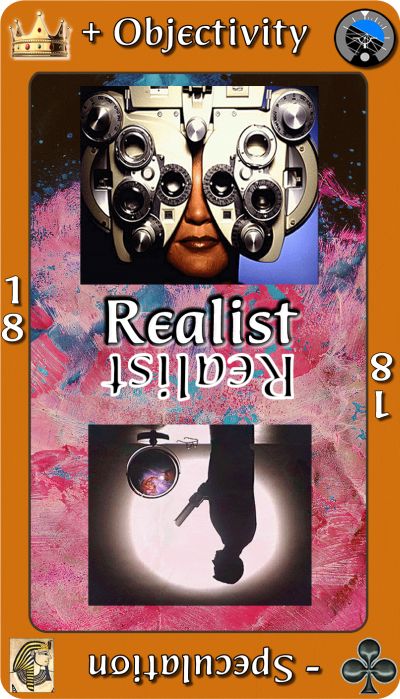18 Realist
“Reality: What a concept!”
Album title by Realist Comedian, Robin Williams
Symbols & Color
- Crown: King Set and Self Determination
- Attitude Gauge: Attitude Group
- Pharaoh: Exalted Orientation – broad scope.
- Clubs: Action Axis
- Border Color = Gold – King Set
Implications of the Upright Position or the Positive Pole
Clarify and sharpen your focus. The Phoropter is an optical device which systematically rotates lenses in front of the viewer’s field of vision. The angle of each presents a unique perspective until a client arrives at an adjustment which brings them into a clarity and focus. By that, to identify what is Objectively there, and not of personal distortion. It takes continuous evaluation and looking at a situation through various lenses to get clear. And regularly, one has to get retested to keep seeing things anew.
Card messages in the Illuminated position.
+ Objectivism
(Perceptive, unbiased, factual, witness, formulation, substantiate, concreteness, veracity)
- There could be a great competition or legal troubles brewing for the one who fails to see obstacles.
- Your assessment is proving realistic. At this point you have enough valid information to proceed.
- “It is what it is.” Objectivity requires accounting for actual circumstance in play. Here, the balance of reason and awareness is key to defining what is relevant, both in proportion and in correct sequence. Focus your analysis on the cost and benefits of your position.
- Reality is what stays around once your beliefs have stopped functioning. Look around and see what remains.
- Focus your analysis on the costs and benefits of your position. That is the profitable way to go.
- “There are some people who live in a dream world, and there are some who face reality; and then there are those who turn one into the other.” – Douglas Everett. Which are you?
- Unlike the Cynic, the Realist’s complementary partner and sometimes nemesis, which tends to consider decisions with a simple binary of black or white, the Realist understands that there are shades of gray and desires not to throw out the “baby with the bath water.” Careful what you reject because you simply ‘don’t like it.’
- Objectify the situation. View it as a Vulcan would: cold, dispassionate, and with sound logic.
- When you are clear, even your subjective evaluation is more spot-on than circumstances may allow. Be like a lawyer and cross examine the facts. Probe for what emotions are beneath them.
- Time to strip away hopes, speculations, and prejudices. What really is? Work with what’s in front of you or is possible to achieve. Now.
Quotes illustrating the Overleaf in this pole
- “Reality is that which, when you stop believing in it, doesn’t go away.” Philip K. Dick
- “Life is not a problem to be solved, but a reality to be experienced.” Soren Kierkegaard
- “True realism consists in revealing the surprising things which habit keeps covered and prevents us from seeing.” Jean Cocteau
Implications in the Reversed Position or Negative Pole
The globe is an abstraction of the Earth. The man standing over it believes he has a global-view of things, but it is merely his partial, subjective perspective of an artificial representation. Talking heads, as media pundits or “experts” are often referred, engage in the act of Speculation about Reality every time they are contacted for their opinion. It is vital to remember that someone’s subjective evaluation is ALWAYS limited to some degree. Yet, that unique variation might be exactly the one that sheds light upon something not seen and possibly beautiful (Card 39 – Higher Moving).
Card messages in the Shadow position.
– Speculation
(supposition, subjective, projecting, selective facts, opinion, appearances, superficiality, bias, confabulation, pronouncement, wavering, interpretation, verisimilitude)
- Experts love to claim superior knowledge with their subjective speculations about real world situations. Filtering through personal beliefs and biases, some facts are present but their assembly is skewed. Are you taking in all the facts or just the ones that support your position? Your assessment of the current situation is just your spin on it. Listen, don’t form a conclusion yet.
- I suppose so.” Is a passive statement accepting at face value what appears to be. Appearances can be deceiving.
- Objectify the situation. View it as a Vulcan would: cold, dispassionate, and with sound logic.
- Remember the dictum: All things being equal – using that as your standard will help reduce extraneous inputs and keep your focus on ‘what is’, instead of ‘what could be’. Here that distinction is crucial for correct assessment.
- Time to strip away hopes, speculations, and prejudices. What really is? Work with what’s in front of you or is possible to achieve. Now.
- Realist Ayn Rand noticed correctly, “We can evade reality, but we cannot evade the consequences of evading reality”. Don’t hide behind the idea of “my truth”. Consensus reality is not an illusion, but everyone’s evaluation of what it means is subjective and incomplete. Look to the facts first.
- Indecision can hamper because one sees so many of the possible outcomes. When “all things are equal” you are the variable that must be accounted for. A choice should be made instead of avoiding making it.
- Realism is an attitude invoked by the King. Act like the sovereign of your own reality and do not give over your self-determination to spirits, religions, or deities. Make your own decision to work with the powers you have not the powers that be.
- In his assessment of mystical experience American folklorist Richard Chase speculated his view of the Ego’s (Card 56 – pole) influence upon the way humans defer power. “Magic is the envelopment and coercion of the objective world by the ego; it is a dynamic subjectivism. Religion is the coercion of the ego by gods and spirits who are objectively conceived beings in control of nature and man.”
- “I suppose so,” is a passive statement accepting at face value what appears to be. Appearances can be deceiving. Something looks good but doesn’t smell right. The apple has a rotten core.
- Just because someone is spouting commonly accepted truisms (memes), doesn’t make them factually correct. No one possesses THE truth and anyone can subjectively misrepresent the facts.
- Your assessment of the current situation is just your spin on it. Listen! Don’t settle on a conclusion just yet. There is still more to know.
- Truthiness, a term reintroduced by comedian Stephen Colbert, is a narrative that has an tempting and deceptive allure to it. It is meant to make a deception sound plausible. Examples would be “If you have nothing to hide, you have nothing to fear.” Sounds legit right? Except, it is common that authoritarians, like the Nazis or extremists like in the Spanish Inquisition, trot it out as a distortion that catches people off guard. Like many thin narratives, (i.e. “one size fits all”), they work only because of its apparent or surface logic…i.e. truthiness.) Who is BS’ing here with solid intent to deceive?
Quotes illustrating the Overleaf in this pole
- “Magic is the envelopment and coercion of the objective world by the ego; it is a dynamic subjectivism. Religion is the coercion of the ego by gods and spirits who are objectively conceived beings in control of nature and man.” Richard Chase – American Folklorist
- “We can evade reality, but we cannot evade the consequences of evading reality” Ayn Rand
Relevance within the Michael Teaching
Behold “all that it is” could very well be the founding premise of the realist. Essence equips a personality with this view point for the purpose of enveloping all that can be tangibly known and accounted for. The need to know and then right action is paramount to the confident of the Realist who puts great stock in making competent choices. Notwithstanding this however, the soul in Realism has the capacity for verisimilitude, seeing the true or factual pattern beneath the surface of conditions or circumstances. This may help in qualities of fairness, accountability, accuracy in assessment and learning, and credibility. This exalted Attitude forestalls judgment by focusing attention on the gathering and assembling of facts. Not to test them like the Skeptic, but locate them and make certain they apply in a given situation. Relevancy is a high concern for the Illuminated pole Realist.
The conflict for the Realist is having a desire for certainly is crippled by the ability to take too many factors into account. The resulting ambivalence can proceed in two directions: toward the person forming a conclusion biased by superficial appearances. Or they are indecisive and allow circumstances to form defensible consensus masking their uncertainty and be defensible in the name of “all things being equal.”
Unlike the Cynic, its complementary partner which tends to consider decisions with a simple binary of black or white; the Realist understands that there are shades of gray and desires not to throw out the “baby with the bath water.” Hence, decision making will appear quite similar to Caution Mode in that it will not be hasty but it will be well considered. Like the Cynic, respect and credibility loom large for Realist. Neither wants to be embarrassed, but the Realist wants to prove its point. The Cynic says “prove it too me.”
Famous Persons
Raymond Burr (pictured above), Princess Diana, Earnest Borgnine, Bella Abzug, Lauren Bacall, Tom Brokaw, John Cleese, Joan Collins, Mario Cuomo, Judge Wapner, Clint Eastwood, Jerry Falwell, Diane Feinstein, Glenn Ford, Michael J. Fox, Katherine Hepburn, Rock Hudson, Grace Jones, Henry Kissinger, C. Everett Koop, Madonna, General Patton, Tina Turner.
Cultural Relevance
 So-called or “talking heads” are often pride themselves on knowing “what is”; a foundation of competency which gives rise to prominence and respect from expertise. In life, one of the most difficult challenges anyone faces is accurately accessing the actual events in a given situation. Required for this first is the application of attention, then impartial honesty in their reporting, accurate identification, and clear labeling of things and circumstances. Beside these faculties, internal filters come into the mix and self-awareness or at least self control are key for the positive pole of Objectivity. Admitting to one’s bias and to the possibility of projecting one’s beliefs onto a situation, lessens the certainty, but increases the credibility and authenticity of the reporter.
So-called or “talking heads” are often pride themselves on knowing “what is”; a foundation of competency which gives rise to prominence and respect from expertise. In life, one of the most difficult challenges anyone faces is accurately accessing the actual events in a given situation. Required for this first is the application of attention, then impartial honesty in their reporting, accurate identification, and clear labeling of things and circumstances. Beside these faculties, internal filters come into the mix and self-awareness or at least self control are key for the positive pole of Objectivity. Admitting to one’s bias and to the possibility of projecting one’s beliefs onto a situation, lessens the certainty, but increases the credibility and authenticity of the reporter.
Whereas the Goal of Discrimination could be considered getting to the lowest common denominator, the Realist Attitude is a process of factoring the equation as if to group things together that connected to each other. In the Shadow side of things, the problem arises where in our haste to pass judgment of win the agreement of our peers or venerated authorities, we can group ideas together that might vaguely sound similar but with a bit of scrutiny, be seen to be out of context to one another.
In the modern era, we find ourselves deluged by factoids that might have no bearing on a decision but are introduced and confuse situations greatly. Issues like climate change, economic parity, and energy policy, have within them many verifiable concrete aspects, but the actual cause and effect and how one builds and argument from them, is muddied by opinion, dogma, and specific agendas – so-called “special interests.” As a result, on many fronts, indecision reigns as law makers and policy wonks search for a way to save face if they are viewed in someway wrong. Here the Cynic asserting “cut the crap” would do us well even more so that the wily Pragmatist who seeks to end stalemates with compromise.
If you are a Realist then you will…
- See every side of a situation.
- Make an effort not to read in what isn’t there.
- Want to make the best informed decision, but there is so much to consider.
- Determine that your opinion has assessed the facts in the most accurate way.
- People come to me because I have a credible opinion.


